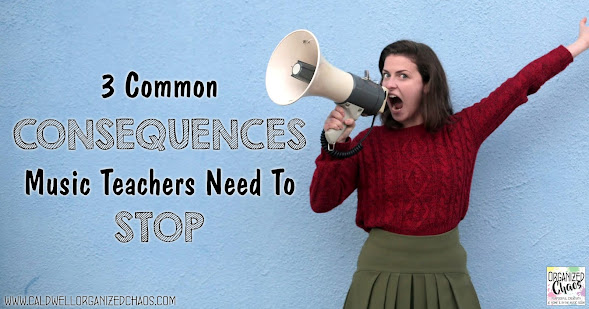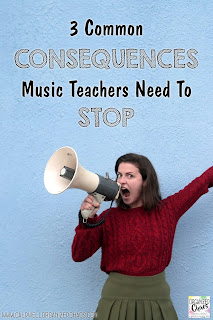1. Give a class intentionally boring worksheets as a consequence for expressing or demonstrating negative attitudes towards regular lesson activities
As logical as it may sound to think that students will appreciate the fun and exciting lesson activities more if they experience what a boring lesson is like, if there is toxic, negative energy going around for whatever reason about your class, making it more boring is not going to help- it's going to make it worse. There is always a ringleader or two that is the root of the negative energy, even if it feels like the whole class is against you. Start by explaining at the end of the lesson that the negative energy is ruining the vibes and preventing the class from having fun and from learning- not every activity or class has to be their favorite, but everyone needs to do their best and have a positive attitude: "don't yuck someone else's yum". Tell them that starting next lesson, you are not going to allow anyone to ruin the positive energy.
As logical as it may sound to think that students will appreciate the fun and exciting lesson activities more if they experience what a boring lesson is like, if there is toxic, negative energy going around for whatever reason about your class, making it more boring is not going to help- it's going to make it worse. There is always a ringleader or two that is the root of the negative energy, even if it feels like the whole class is against you. Start by explaining at the end of the lesson that the negative energy is ruining the vibes and preventing the class from having fun and from learning- not every activity or class has to be their favorite, but everyone needs to do their best and have a positive attitude: "don't yuck someone else's yum". Tell them that starting next lesson, you are not going to allow anyone to ruin the positive energy.
If possible, make someone- the principal, the social worker, etc- aware of the situation and that you are trying to turn around the negative energy in a class. Warn them ahead of time that you may need backup during a particular class period while you handle the situation, and work out a plan, either for someone to push in or be prepared to take students, if you need it. I know sometimes teachers don't have adequate support staff or their administrator is unsupportive- in that case I would get a colleague on board who is willing to have a student or two come in their room. But I would encourage you to try to advocate for someone to be available to come in if needed- I've found administrators and support staff appreciate when you explain all the things you've already tried and that you are wanting to do this as a short-term strategy to keep everyone in class instead of having to throw them out or stop your lessons in the long run.
Once you've established that you expect everyone to keep negative energy to themselves, start the next lesson overflowing with positive energy, grinning as soon as you see them to show you're excited about having a good time that day. Don't plan anything different than what you normally would have, but be super excited about everything. Give positive reinforcement for all the students who are engaged, whether that's points or whatever other positive reward you have in place in your school or classroom (if you don't have one, start one and explain what it is to everyone!). As soon as the first person starts to make a negative comment/ face (even if it's right as they enter the room), try to quickly catch them and remind them to keep it positive. If they don't, ask them to sit away from the rest of the class and take their negative energy elsewhere and go back to having fun with the others. If they are still disrupting the lesson, offer to let them write down their negative thoughts instead of saying them out loud and spreading their negativity. If that doesn't work, put the backup plan into action: ideally I think it works best if there is someone that can be on call to come and sit with the negative student(s) while you proceed with the others, but if not, get them to leave the room, whether it's the principal's office, another classroom, or somewhere else. The goal is to turn the tide so that the majority of the class that was getting sucked into the negativity before, gets sucked into your positive energy instead.
If you have to have a student (or several students) leave the room, it will be important to follow up with that student after class. Often they will be happy that they got to leave the class they were complaining about (which is why it's best to find a way for someone to come in if at all possible)! So there needs to be a consequence for that specific student, whether that's giving makeup work, calling/ writing home, or something else to make sure that student doesn't want this to keep happening. Having that positive reward for the students who were engaged will help here too, since obviously the ones who left will not get whatever the others did. It will get easier and easier to get those students to at least tone down their negativity to a manageable level once the attitude of the rest of the class is positive- it has never taken me more than 4 class periods of this to turn the class around.
2. Put away instruments and ban their use from the entire class because of chaotic behavior while using them or damaging an instrument(s)
If students don't know how to use instruments properly, giving them less opportunity to learn how is not going to help long-term. It's also never helpful to punish an entire class for something that most likely wasn't something everyone did. First of all, I have a strict rule in place of, "if you play before I say you'll make the instrument go away". I tell them every single time we get out instruments, and I also remind them often that I'm not here to judge if it was intentional or accidental- if you touch/ make sound with something when you're not supposed to, you will miss a turn with that instrument. The key is to make sure the time they lose the instrument is short and then they quickly get a chance to try again and do it right.
If as a group a class is too chaotic while using/ getting out instruments, slow it way down to whatever point you need to be able to monitor each student more closely. Sometimes that means only half the class plays at a time instead of everyone at once, having one student at a time go and get out their instrument while the rest of the class waits and watches and you narrate the correct way of doing it every step of the way, or having a few students designated to get out an instrument for others, etc.
3. Having a class practice coming into class silently/ calmly over and over until they are all coming in the way you expect
I used to do this ALL THE TIME at the beginning of my career. Having students practice a behavior or procedure the right way when they do it wrong is obviously a good thing. But again, punishing an entire class for something that is probably not something everyone is doing is only going to make students feel frustrated and agitated, not calm and focused like you want them to be.
If the vast majority of a class comes into my room too rambunctiously, I will definitely stop and have them go back and try again. But 1) I only do it one time and I make sure to give positive reinforcement to the ones that do it right, and 2) I do not have them go back in the hallway- I have them line up as close to the door as possible but still inside my room, and then walk to their spots from there. I find going back in the hallway is counterproductive because I never know who else is going to walk by making noise and/or distracting my students, and usually sound carries a lot more in the hallway so every little noise is amplified. I keep them in my controlled environment to practice instead.
If it's just a few students, obviously I just ask those few students to do it again. If the class has practiced once there will only be a few students, if any, who still aren't doing it right- in that case I will have those few students try it again by themselves. But again, only once- after that it just turns into a power struggle and it's not effective. If I still have students who are running/ talking loudly etc after that, I tell them we will practice another time and move on. I talk to the homeroom teachers and/or principal and figure out a time when I can take them by themselves and practice walking appropriately (some years I've been lucky enough to be available to do it during their recess, other times I take them first thing in the morning when everyone else has circle time, or immediately after class).
As a sidenote, one thing that has helped tremendously with this problem specifically is I've stopped needing my students to walk in silently. Yes, they should not be yelling, running, or touching other people or things, but the thing that has helped me get everyone focused right away without requiring them to be silent is to immediately start student-led warmups. It took away so many power struggles to start class this way! Check out this post on how I do that, and this post for a whole bunch of activity ideas for warmups.
I know this may ruffle some feathers but I hope this gives teachers some new ideas to try that will help turn the tide in a positive direction! I would love to hear your thoughts on these common consequences, and any other strategies you have used effectively in these situations, in the comments below.



No comments :
Post a Comment